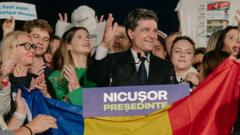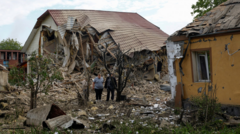President Vladimir Putin's persistent quest for an end to the Ukraine conflict on his terms has led him into a complex web of diplomacy that remains anchored in ongoing warfare. Despite external pressures from Ukraine, the European Union, and previously, the United States, Putin's hardline stance has persisted, particularly following a recent phone call with American President Donald Trump.
Putin's Diplomatic Maneuvering Hits Economic Roadblocks Following Trump Call

Putin's Diplomatic Maneuvering Hits Economic Roadblocks Following Trump Call
In recent discussions, President Putin aims for peace in Ukraine while navigating complicated diplomatic channels, facing economic pitfalls.
In this pivotal discussion, Trump framed the discourse around direct negotiations between Ukraine and Russia as a potential step toward a cease-fire and broader peace, marking a significant shift from his earlier commitments to swiftly resolve the situation. This shift, while viewed as a political win for Putin, poses risks to his economic aspirations of mending relations with the U.S.
Trump made it clear that any economic revival or lifting of sanctions against Russia hinges purely on achieving peace in Ukraine. He emphasized, “Russia wants to do large scale trade with the United States when this catastrophic ‘bloodbath’ is over.” Such a condition intertwines the fates of the two issues, casting Russia into a state of economic limbo with limited prospects for relief from western sanctions without a corresponding peace deal.
Despite the increasing isolation from Western economies, officials in Moscow indicate a readiness to bear the brunt of fresh sanctions, claiming expertise in adapting to external pressures. However, the intertwining of sanctions relief with the resolution of conflict may lead to prolonged economic hardship for Russia, should negotiations continue to stall.
As these diplomatic efforts unfold, eyes remain on the implications for not only Russia's military strategy but also its economic future, threading a delicate balance in international relations.
Trump made it clear that any economic revival or lifting of sanctions against Russia hinges purely on achieving peace in Ukraine. He emphasized, “Russia wants to do large scale trade with the United States when this catastrophic ‘bloodbath’ is over.” Such a condition intertwines the fates of the two issues, casting Russia into a state of economic limbo with limited prospects for relief from western sanctions without a corresponding peace deal.
Despite the increasing isolation from Western economies, officials in Moscow indicate a readiness to bear the brunt of fresh sanctions, claiming expertise in adapting to external pressures. However, the intertwining of sanctions relief with the resolution of conflict may lead to prolonged economic hardship for Russia, should negotiations continue to stall.
As these diplomatic efforts unfold, eyes remain on the implications for not only Russia's military strategy but also its economic future, threading a delicate balance in international relations.






















